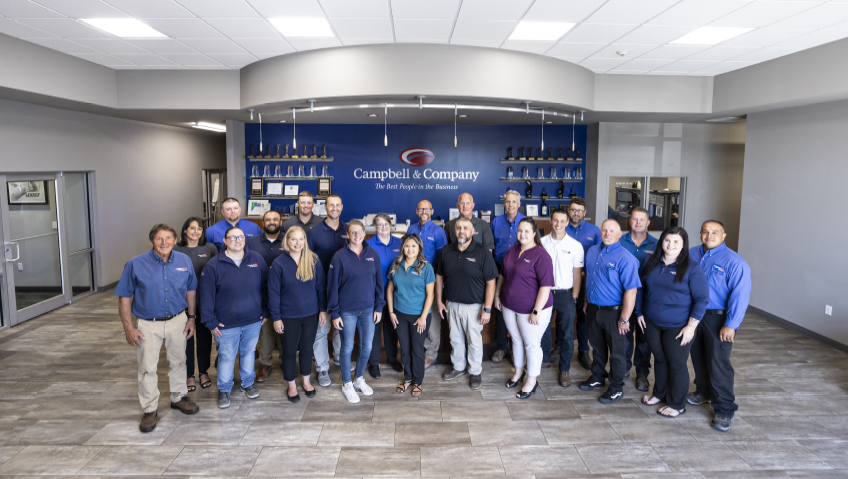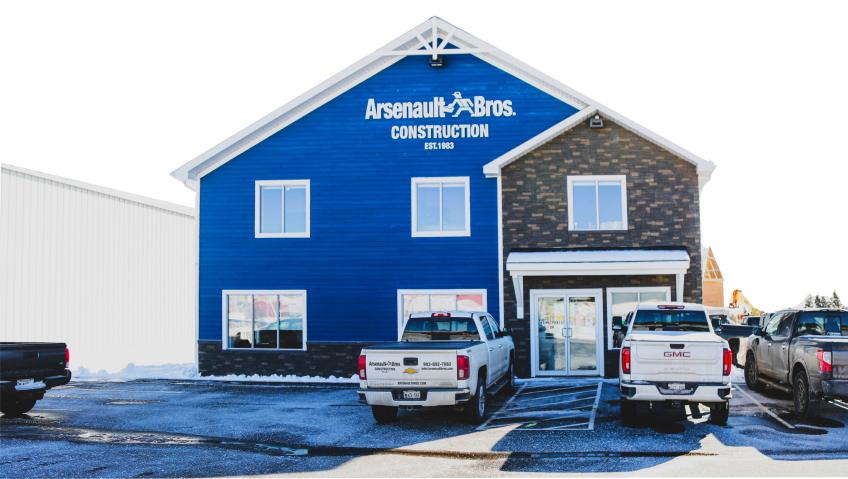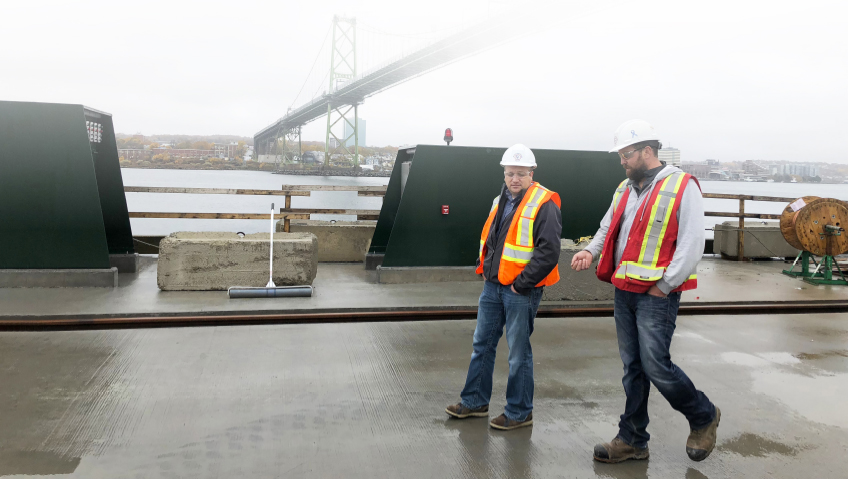In the Tri-City area of central Washington State, Campbell & Company offers maintenance, replacement, and repair service for HVAC, plumbing, sewer and electrical systems for both residential and commercial customers. Holding itself to the highest degree of professional standards, Campbell & Company’s team continues to grow even in the face of economic uncertainty, forming a highly dedicated workforce bringing the finest service to the Pacific Northwest. Now, Campbell has embarked on a bold new venture to bring its quality to an even higher standard.
Campbell & Company traces its lineage to founder and namesake Mike Campbell, who established a small HVAC repair and installation shop in 1983. Nearly 40 years later, Campbell serves over 650,000 customers in the area, serving their plumbing, electrical and sewer needs in addition to HVAC. General Manager Brian Campbell, Mike’s son, is now taking his father’s company into a bright new future.
Despite his company’s unprecedented growth, Brian explains that he and his colleagues are staying true to its original philosophy. “We’ve been growing like crazy, and anytime you experience that level of success as a business, you have an additional level of responsibility,” he says—responsibility to the team and to the broader community. “We’ve tried to make sure we’re evolving in every aspect of the business, not just in revenue,” he says.
Part of this revenue increase has come from Campbell & Company’s desire to become less seasonal and operate year-round, an effort which has helped the company increase both wages and retention. Additionally, new customer service lines help Campbell & Company serve as ‘one-stop shop’ for its customers, providing a robust and loyal customer base.
Campbell has always operated on a philosophy of closely held values, which Brian Campbell says persist even in today’s rocky world. “A business has the ethical responsibility to provide its customers with a fairly valued service for a job done right,” he says, explaining the company’s philosophy of providing regular maintenance, thereby saving its customers money in the long run. “Doing preventative maintenance and completing repairs and installations the right way is the most cost-effective way to manage any mechanical systems.”
Indeed, in an era defined by supply chain woes, Campbell & Company is relying on its reputation and network to keep jobs moving. Brian relates how the company has worked with its vendors and other industry peers to anticipate shortages and then secure supplies of parts and equipment to have them on hand when competitors won’t. “We’ve placed some significant stocking orders on critical equipment and repair parts throughout the last two years,” he shares. Multi-year contracts with specific vendors help secure parts at fixed prices.
Despite rising costs and the resulting risk of losing customers, Campbell & Company refuses to cut corners and reduce quality to save money. Brian says Campbell’s level of trust and transparency with its customers has persisted through both good and lean times, leveraging its pre-pandemic policy of clear communication. This, he says, lets customers know and understand why changes are coming and how that may change their relationship.
As a measure of its continual focus on professional development and operational success, Campbell & Company is embarking on a new partnership with the TurnPoint Services Group, a collection of service brands across the Continental United States. From its headquarters in Louisville, Kentucky, TurnPoint helps coordinate nearly 50 varying HVAC, plumbing, electrical and sewer service brands. Describing itself as a ‘servant-leg organization,’ TurnPoint emphasizes principle over policy in its cultural emphasis, leaving its brand partners free to focus on their own customers and employees while remaining secure through TurnPoint’s overall support. TurnPoint provides world-class tools, support, technology, and other valuable resources that will support Campbell’s local brand equity and commitment to delivering high-value customer experiences.
Curtis Bragg, TurnPoint’s Chief Strategy Officer, lays out the relationship succinctly: “The story of TurnPoint begins with the story of Campbell & Company and all the other brands that comprise TurnPoint,” he says. Since Campbell’s partnership with TurnPoint began in September 2021, the two businesses have been working closely together to bring about an even higher quality of service to Campbell’s customers.
The result is a mutually beneficial relationship, as Curtis makes clear TurnPoint reaches out to companies already doing well on their own. “We’re not looking to interfere,” he says. From TurnPoint’s national network, Campbell is now enjoying enhanced benefits for its team members, additional operational support in the field, considerable professional development opportunities, and training for team members. TurnPoint, for its part, gains new in-roads in the Pacific Northwest and helps ease Campbell’s growing pains.
For Brian, this partnership has come about at just the right time in Campbell’s history. “The more advanced a business gets, the more you’re pulled away from the fun parts—why you got into the business in the first place,” he says. When the question arose as to how he and his colleagues could afford to stay engaged with both customers and team members, TurnPoint stepped forward to offer a new solution. As Curtis remarks, TurnPoint has been able to offer high-level support and ensure Campbell’s staff is able to take care of daily business. “It’s really about being better at what you’ve already been doing, because you can concentrate on the things that are truly important to the business and we’re here to support the rest,” he says.
Further, TurnPoint and Campbell share a great deal in their business strategies and cultures, in particular a focus on continuous improvement for both staff and management. Brian remarks how even small changes at a high level can have rippling effects. “One percent improvements throughout the business make drastic differences, and it’s been a great partnership in that aspect so far,” he says.
One of these improvements is a new focus on employee recognition. As part of its employee retention strategy, Campbell has been ramping up its employee recognition efforts to an all-time high. Brian remarks how, more than big things, it’s often the little things that businesses do that keep the core workforce intact. “Every business wants to have an engaged workforce,” he says, “and we can’t expect them to be engaged if we’re not engaged with each of them.”
Commercial Project Foreman Jerry Cooper, who has been with the company for 16 years, says that, “Our insurance and retirement plan has seen a significant improvement [since partnering with TurnPoint]. I really like that I can have half of retirement go into a Roth and the other half go into a traditional account. I really appreciate UKG/Kronos; it is really nice to be able to submit time off from anywhere, and I also appreciate the formatting and ability to check out old paystubs and whatnot. It is comforting that Mike and Brian are still available and willing to listen and help with any day to day issues. Honestly we have seen minimal change in the day to day operation; we are still Campbell & Company.”
HVAC Technician Josh James, who has been at the company for two years, agrees. “Our benefits package and 401(k) has improved. It has also improved our ability to get parts and equipment so we can serve our customers in a timely manner. As a technician, it is nice to see new vehicles in our fleet; it seems that other businesses are struggling in these areas and we are excelling.”
On top of this day-to-day employee support, Campbell & Company hosts annual recognition events, holiday parties, summer days out, cornhole tournaments, and more. Smaller gestures such as small gifts to new parents and first homeowners are also a part of the company culture. “Those are big milestone achievements on their end,” Brian says, while also noting that recent struggles have placed small victories in a new and better light. “The last handful of years, it’s really trying to be engaged in the day-to-day victories,” he shares. He relates examples of a technician struggling on a repair job and working to overcome a barrier of learning by studying outside of work hours. That hidden battle, Brian relates, is being highlighted as well.
The result is a new workplace atmosphere. “You can feel it in the hallways—there’s more laughter, there are great people who genuinely care about the people they work with,” Brian says. Beyond mere words, these improvements are quantifiable through annual engagement scores and surveys. “Over the last three years, we’ve gone from 59 percent to 83 percent,” Brian says proudly. Additionally, retention has jumped from 72 percent in 2019 to 92 percent today. To Brian, this all vindicates Campbell & Company’s philosophy of offering long-term employment: “Really, we’re not here to hire and fill jobs, we’re here to support careers, and we look for the efforts that employees are making that facilitate a great career.”
His counterpart at TurnPoint agrees. “At TurnPoint, we’re all about building the company we would want to work for, and that all starts on the front line with the employees,” Curtis says. “It’s not about the hoopla and great events; it’s about the day-to-day engagement and caring about the most important part of your business, which is the people who are out there interacting with your customers every day.” A former HVAC tech himself, Curtis echoes Brian’s deep passion for the trades and their importance to economies. “It is about creating a career path, not just creating and filling a job.”
With the new partnership between Campbell & Company and TurnPoint Systems, the two companies are able to pool their talents—proof that the whole is indeed greater than the sum of its parts. Both Brian and Curtis relate plans to continue to grow Campbell’s workforce, which will help ease the training of the next generation of American trades professionals. Internal training programs, developed with the aid of TurnPoint’s operational expertise, will help make the coming generational transition as smooth as possible.
“We’re investing in that overall educational ecosystem,” Curtis says. “You need people to be able to fill the gap when growth occurs, and you can’t start doing that soon enough.”






